Israel’s Firm Stance Against Hezbollah Rebuilding in Lebanon
As tensions simmer along Israel’s northern border, Defense Minister Israel Katz has issued a stark warning to Lebanon about Hezbollah’s ongoing activities. “Hezbollah is playing with fire, and the president of Lebanon is dragging his feet,” Katz declared on Sunday. His message was clear: the Lebanese government must fulfill its commitment to dismantle Hezbollah’s weapons and remove the Iran-backed group from southern Lebanon. “Enforcement will continue and deepen—we will not allow a threat to the residents of the north,” he added. This statement comes amid growing concerns that Lebanon is failing to enforce last year’s ceasefire terms, while Hezbollah actively works to rebuild its forces with Iranian support. The situation has prompted the Israel Defense Forces (IDF) to consider broader operations against the terrorist organization following repeated violations of the truce.
On the ground, the reality remains troubling according to IDF personnel. A senior officer stationed on the northern border revealed in an exclusive interview that Hezbollah retains its full arsenal and continues to receive funding from Iran. “Hezbollah didn’t give up their heavy weapons,” the officer explained. “They’re still trained, still financed by Iran, and still trying to re-establish their positions. Our job is to make sure they don’t succeed.” This assessment was underscored by recent IDF operations that resulted in the elimination of two Hezbollah commanders in southern Lebanon. Muhammad Ali Hadid, a senior member of Hezbollah’s elite Radwan Force, was killed in Nabatieh, while another operative was struck in Ayta ash Shab after being observed gathering intelligence on Israeli positions. The IDF justified these actions by stating, “The terrorists’ activities violated the understandings between Israel and Lebanon,” and affirmed their commitment to “continue to operate to remove any threat to the State of Israel.”
Israel’s approach reflects a fundamental shift in its security doctrine following the October 7 attack. The senior IDF officer explained this new proactive stance: “If somebody threatens us, we take control of the situation and make the threat go away. We pushed Hezbollah back, so civilians could return. Now we’re fortifying those gains and acting to prevent their recovery.” The traumatic events of October 7 have left an indelible mark on Israeli military thinking. “Until then, we sometimes looked the other way. That’s over. We’re not sitting and waiting for the next rocket,” the officer emphasized. This heightened state of readiness was recently demonstrated when the IDF’s 91st Division completed its largest exercise since the start of the war, designed to strengthen operational readiness across all domains—sea, air, and land. “We tested our defensive systems, coordination, and rapid-response capabilities,” the officer noted. “We’re applying every lesson from October 7 so our response next time will be immediate.”
Intelligence reports paint a concerning picture of Hezbollah’s recovery efforts. According to Israel’s Haaretz newspaper, the group is rapidly rebuilding its arsenal with Iranian assistance, partially restoring its weapons supply chain through Syria and Iraq despite disruptions following the collapse of the Assad regime last year. The situation has also drawn criticism from the Trump administration, with U.S. Special Envoy Thomas Barrack describing Lebanon as “a failed state” due to its “paralyzed government.” Barrack pointed out a telling economic reality: Hezbollah pays its fighters more than Lebanon’s national army soldiers earn, highlighting the group’s financial strength relative to the struggling Lebanese state. The Lebanese government, for its part, has responded to Israel’s preemptive strikes with diplomatic appeals. Foreign Minister Youssef Raggi urged his visiting German counterpart to “help pressure Israel to halt its attacks,” insisting that “only a diplomatic solution, not a military one, can ensure stability and maintain calm in the south.” He claimed the Lebanese government “is gradually moving forward with its decision to bring all weapons under state control,” though Israeli officials remain skeptical of these assurances.
The United Nations Interim Force in Lebanon (UNIFIL) has expressed “deep concerns” about the escalating situation, urging all parties “to fully commit to the cessation of hostilities.” UNIFIL emphasized its ongoing contact with the Lebanese Armed Forces and reiterated that extending state authority “is at the very core of Resolution 1701,” the UN Security Council resolution that ended the 2006 Lebanon War. This international framework calls for the disarmament of all armed groups in Lebanon, with only the Lebanese Armed Forces authorized to bear weapons south of the Litani River. Yet implementation has remained elusive, with Hezbollah maintaining its military presence in the region for years despite the resolution’s requirements.
Despite diplomatic criticism of Israel’s proactive operations, IDF commanders remain resolute in their determination to prevent Hezbollah from regaining strength along the border. “We won’t wait for another October 7,” the Israeli officer stated plainly. “We’re vigilant, we’re rebuilding, and we’re ready. The quiet we have now depends on Hezbollah’s choices—not on our willingness to defend ourselves.” This stance reflects Israel’s broader security approach in the post-October 7 era: a determination to address threats before they materialize into attacks against Israeli civilians. As Lebanon struggles with political paralysis and economic crisis, and as Hezbollah continues to receive support from Iran, the future of the border region remains uncertain. What seems increasingly clear, however, is Israel’s unwillingness to allow a return to the status quo that preceded the recent conflict—a status quo that Israeli leaders now view as having enabled the deadly October 7 attacks. For residents of northern Israel who have only recently returned to their homes after months of evacuation, the IDF’s commitment to preventing Hezbollah’s resurgence represents a crucial security guarantee in an increasingly volatile region.


